Japan is set to begin pumping more than a million tonnes of treated water from the destroyed Fukushima Daiichi nuclear power plant today, a process that will take decades to complete. The water was distilled after being contaminated from contact with fuel rods at the reactor, destroyed in the 2011 earthquake. Tanks on the site now hold about 1.3 million tonnes of radioactive water — enough to fill 500 Olympic-sized swimming pools. After being filtered and diluted, the water will be released over a 30-year period. The Tokyo Electric Power Company (Tepco), the nuclear plant’s operator, has been tasked with carrying out the plan. Here is how Tepco plans to deal with it: What is Japan’s water release plan? Tepco has been filtering the contaminated water to remove isotopes, leaving only tritium, a radioactive isotope of hydrogen that is hard to separate. Tepco will dilute the water until tritium levels fall below regulatory limits before pumping it into the ocean from the coastal site. Water containing tritium is routinely released from nuclear plants around the world, and regulatory authorities support dealing with the Fukushima water in this way. Tritium is considered to be relatively harmless because its radiation is not energetic enough to penetrate human skin. When ingested at levels above those in the released water it can raise cancer risks, a Scientific American article said in 2014. The water disposal will take decades to complete, with ongoing filtering and dilution, alongside the planned decommissioning of the plant. Is the water safe? Japan and scientific organisations say the released water is safe, but environmental activists argue that all the possible impacts have not been studied. Japan says it needs to start releasing the water as storage tanks are full. [caption id=“attachment_13033272” align=“alignnone” width=“640”] An aerial view shows the storage tanks for treated water at the tsunami-crippled Fukushima Daiichi nuclear power plant in Okuma town, Fukushima prefecture, Japan. Reuters[/caption] The International Atomic Energy Agency (IAEA), the UN nuclear watchdog, greenlighted the plan in July, saying that it met international standards and that the impact it would have on people and the environment was “negligible”. Greenpeace said on Tuesday that the radiological risks have not been fully assessed, and that the biological impacts of tritium, carbon-14, strontium-90 and iodine-129 — to be released with the water — ‘have been ignored’. The filtering process will remove strontium-90 and iodine-129, and the concentration of carbon-14 in the contaminated water is far lower than its regulatory standard for discharge, according to Tepco and Japanese government documents. Japan said tritium levels in the water will be below those considered safe for drinking under World Health Organisation standards. “Meanwhile, it is not the practice of any country to drink the water discharged from nuclear facilities,” Japan’s mission to the International Atomic Energy Agency said last week. The government will take “appropriate measures, including immediate suspension of the discharge” if unusually high concentrations of radioactive materials are detected, the document said. The South Korean government has concluded from its own study that the water release meets international standards and said it respects the IAEA’s assessment. How have people reacted? Tepco has been engaging with fishing communities and other stakeholders and is promoting agriculture, fishery and forest products in stores and restaurants to reduce any reputational harm to produce from the area. Fishing unions in Fukushima have urged the government for years not to release the water, arguing it would undo work to restore the damaged reputation of their fisheries. [caption id=“attachment_13033242” align=“alignnone” width=“640”]
 Tanks on the site now hold about 1.3 million tonnes of radioactive water — enough to fill 500 Olympic-sized swimming pools. AP[/caption] Masanobu Sakamoto, the head of the National Federation of Fisheries Cooperative Associations, said on Monday the group understood the release could be scientifically safe but still feared reputational damage. Neighbouring countries have also expressed concern. China has been the most vocal, calling Japan’s plan irresponsible, unpopular and unilateral. China is the biggest importer of Japanese seafood. Shortly after the 2011 tsunami and earthquake damaged the Fukushima plant, China banned imports of food and agricultural products from five Japanese prefectures. China later widened its ban to cover 10 out of Japan’s 47 prefectures. The latest import restrictions were imposed in July after the IAEA approved Japan’s plans to discharge the treated water. With inputs from Reuters
Tanks on the site now hold about 1.3 million tonnes of radioactive water — enough to fill 500 Olympic-sized swimming pools. AP[/caption] Masanobu Sakamoto, the head of the National Federation of Fisheries Cooperative Associations, said on Monday the group understood the release could be scientifically safe but still feared reputational damage. Neighbouring countries have also expressed concern. China has been the most vocal, calling Japan’s plan irresponsible, unpopular and unilateral. China is the biggest importer of Japanese seafood. Shortly after the 2011 tsunami and earthquake damaged the Fukushima plant, China banned imports of food and agricultural products from five Japanese prefectures. China later widened its ban to cover 10 out of Japan’s 47 prefectures. The latest import restrictions were imposed in July after the IAEA approved Japan’s plans to discharge the treated water. With inputs from Reuters
Tanks at the Fukushima Daiichi nuclear power now hold about 1.3 million tonnes of radioactive water — enough to fill 500 Olympic-sized swimming pools. After being filtered and diluted, the water will be released over a 30-year period
Advertisement
End of Article


)

)
)
)
)
)
)
)
)



